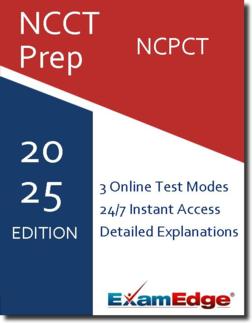NCCT NCPCT (NCPCT) Practice Tests & Test Prep by Exam Edge - FAQ
Based on 34 Reviews
- Real Exam Simulation: Timed questions and matching content build comfort for your NCCT NCPCT test day.
- Instant, 24/7 Access: Web-based NCCT National Patient Care Technician practice exams with no software needed.
- Clear Explanations: Step-by-step answers and explanations for your NCCT exam to strengthen understanding.
- Boosted Confidence: Reduces anxiety and improves test-taking skills to ace your NCCT National Patient Care Technician (NCPCT).

Why should I use Exam Edge to prepare for the NCCT National Patient Care Technician Exam?
FAQ's for Exam Edge NCCT National Patient Care Technician practice tests
- Comprehensive content: Exam Edge's NCCT National Patient Care Technician practice tests are created specifically to prepare you for the real exam. All our NCCT NCPCT practice test questions parallel the topics covered on the real test. The topics themselves are covered in the same proportions as the real test too, based on outlines provided by the National Center for Competency Testing in their NCCT NCPCT test guidelines.
- Realistic practice: Our NCCT NCPCT practice exams are designed to help familiarize you with the real test. With the same time limits as the real exam, Our NCCT practice tests enable you to practice your pacing and time management ahead of test day.
- Detailed explanations: As you complete your practice tests, we show you which questions you answered correctly and which ones you answered incorrectly, in addition to providing you with detailed step-by-step explanations for every single NCCT National Patient Care Technician practice exam question.
- Performance insights: After you complete a practice test, we provide you with your raw score (how many you answered correctly) and our estimate of the NCCT NCPCT score you would have received if you had taken the real test.
- Ease of access: Because all Our NCCT practice tests are web-based, there is no software to install. You can take NCCT NCPCT practice exams on any device with access to the internet, at any time.
- Flexible use: If you must pause while taking one of Our NCCT practice exam, you can continue right where you left off. When you continue the test, you will start exactly where you were, and with the same amount of time you had remaining.
- Thousands of unique questions: We offer 20 different online practice exams with 2,000 unique questions to help you prepare for your NCCT National Patient Care Technician !
- Low cost: The cost of ordering 5 practice tests is less than the cost of taking the real NCCT NCPCT test. In other words, it would be less expensive to order 5 practice tests than to retake the real NCCT National Patient Care Technician exam!
- Our trusted reputation: As a fully accredited member of the Better Business Bureau, we uphold the highest level of business standards. You can rest assured that we maintain all of the BBB Standards for Trust.
- Additional support: If you need additional help, we offer specialized tutoring. Our tutors are trained to help prepare you for success on the NCCT National Patient Care Technician exam.
What score do I need to pass the NCCT NCPCT Exam?
To pass the NCCT National Patient Care Technician test you need a score of .
The range of possible scores is 0 to 100.
How do I know the practice tests are reflective of the actual NCCT National Patient Care Technician ?
At Exam Edge, we are proud to invest time and effort to make sure that Our NCCT practice tests are as realistic as possible. Our practice tests help you prepare by replicating key qualities of the real test, including:
- The topics covered
- The level of difficulty
- The maximum time-limit
- The look and feel of navigating the exam
Do you offer practice tests for other National Center for Competency Testing subjects?
Yes! We offer practice tests for 7 different exam subjects, and there are 115 unique exams utilizing 11500 practice exam questions. Every subject has a free sample practice test you can try too!
NCCT ECG Technician
(NCET
®
)
Practice Tests
NCCT Medical Assistant Certification (NCMA)
Practice Tests
NCCT National Certified Phlebotomy Technician (NCPT)
Practice Tests
NCCT National Insurance and Coding Specialist (NCICS)
Practice Tests
NCCT National Medical Office Assistant Certification (NCMOA)
Practice Tests
NCCT National Patient Care Technician (NCPCT)
Practice Tests
NCCT Surgical Technologist
(TS-C
®
)
Practice Tests
To order tests, or take a sample test, for a different subject:
Click on ' Name on the Exam Name' You will be take to the orders page
How do I register for the real National Center for Competency Testing?
For up-to-date information about registration for the National Center for Competency Testing, refer to the National Center for Competency Testing website.


